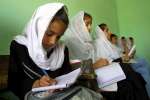Pakistan helping communities that have hosted Afghan refugees
News Stories, 24 August 2011
FEROZAI KAN, Pakistan, August 24 (UNHCR) – In a region where sunshine is plentiful but rain is scarce, the use of solar power to pump groundwater is providing an innovative solution for thousands of people living in arid and remote villages in Balochistan in southern Pakistan.
Two gleaming solar panels look out of place surrounded by the mud homes that make up the village of Ferozai Kan, around 100 kilometres north-west of the provincial capital, Quetta. Since February, the panels have been powering a pump that carries water from a deep underground well to large plastic containers.
The well is the only source of water for Ferozai Kan as well as for several nearby villages and, until the solar pump was completed, retrieving water meant heaving a rope attached to a bucket up from the well floor – over and over again. In the conservative culture of rural Balochistan, the twice daily chore of fetching water is traditionally seen as women's work.
The solar project is part of a joint programme between the government of Pakistan and several UN agencies, among them UNHCR, to provide developmental assistance to communities that have hosted Afghan refugees.
Projects implemented under the Refugee Affected and Hosting Areas (RAHA) initiative are designed to improve the lives of people living in locations that have been impacted by the 30-year presence of Afghan refugees in Pakistan. By addressing the needs of host communities as well as those of the refugees, the RAHA programme seeks to promote coexistence and social cohesion.
"While the RAHA programme engenders goodwill between the local Pakistani communities and Afghans, another key objective is the revival of the environment which was impacted by the presence of Afghan refugees for over three decades," said Jose Belleza, head of the UNHCR office in Quetta. "The creation of sustainable livelihoods and the provision and enhancement of basic services benefit both communities."
In Farozai Kan, as elsewhere in Balochistan, RAHA projects have provided both high and low-tech solutions to address communities' needs. As well as installing the solar-powered water pump, UNHCR implementing partner, the Balochistan Rural Support Programme (BRSP), built the village's first pit latrines.
In most cases, BRSP looks to beneficiary communities to cover part of the cost of the projects. "If communities have invested in a project, they're more likely to get behind it and see it succeed," said Essa Khan, a regional programme manager for the organization.
Involving communities in the maintenance of projects after they've been installed had been a problem in the past, said Khan. In Farozai Kan each household contributes 50 rupees, or about 45 US cents, a month towards the upkeep of the solar pump.
"In the beginning we had problems learning the new technology," said Atta Mohammed, a community leader. "But now we are able to train others how to use it."
The RAHA initiative was launched in 2009 under the joint One UN programme in Pakistan with an initial appeal of US$140 million over five years. The initiative is expected to benefit up to 2.5 million Pakistanis and Afghans. The programme's interventions cover the sectors of education, health, water, sanitation and hygiene and livelihoods.
Since its launch more than 400 projects have been completed and another 100 are under way, mainly in the provinces of Balochistan and Khyber Pakhtunkhwa, both home to high concentrations of Afghan refugees.
Bibi Mena runs a vocational training centre in Killa Saifullah that teaches women to become tailors. The women make clothes that are sold in local markets and their skills are in increasing demand by residents seeking clothing repairs and alterations. "The women who come here really appreciate the opportunity to learn new skills. Many have started to bring their daughters as well," she said.
Under the RAHA initiative, a refugee affected area is one that hosted large numbers of Afghan refugees in the past, but from where the majority of the refugees have left or returned home. A refugee hosting area is a community or area that continues to host some of the 1.7 million Afghan refugees currently living in Pakistan.
By Tim Irwin in Ferozai Kan, Pakistan




















































